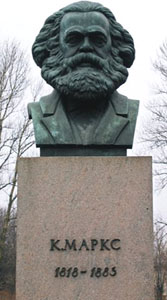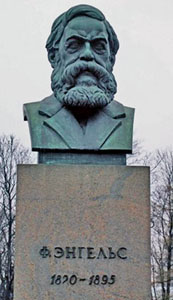Amazing what one can find while wondering the streets, museums, canals and gardens of St. Petersburg on a "sunny," spring day. Photos by Bob Depczenski.
The more that I think about Marxism and the Marxist heritage in Russia, the more I wonder just what was/is Marxism, because what Karl Marx (1818-1883) and Friedrich Engels (1820-1895) thought that they were describing when they developed their ideas of Marxism certainly did not fit the Russia situation.
One of the reasons why Marxism took root in Russia derives from the revolutionary tradition established in nineteenth-century Russia, and you can easily trace a revolutionary line of descent from the Decembrists to the intelligentsia of the 1840s and then to the populists (in both their moderate and terrorist manifestations) of the 1870s.
Now the populists were very important. Georgii Plekhanov (1856-1918), the founder of Russian Marxism, was a populist who never saw a factory worker, but the populist wager on the peasant as a revolutionary force failed. The alternative, political assassination, had not appeared to work either, even though the radicals had managed to blow up Tsar Alexander II. So Plekhanov searched around for an explanation of how a revolution could occur in Russia, and he settled on Marxism and its bet on the workers as the real revolutionary force.
Problem #1. In the 1880s, Russia had no workers; Russia was not capitalist.
Problem #2. In the 1890s Russia had a few more workers, but Russia was still not capitalist. Industrial development was state-directed, state-sponsored.
Problem #3. By 1900-1914, Russia had a lot more workers, but still the working class comprised only maybe 2-3% of the Empire's population.
So, how was there ever going to be a Marxist Revolution in Russia. Someone needed to make some slight "modifications" to Marx's ideas for the Russian case. Before I go any further, let me note that Marx never really wrote in terms of "national" Marxist revolutions, e.g., a Russian revolution. He thought in terms of an international revolution in which the working class of all countries, united as one, rose up to overthrow the worldwide capitalist system.
Lenin (Vladimir Il'ich Ulianov, 1870-1924) and Trotskii (Lev Davidovich Bronshtein, 1879-1940) provided the "solution" to these problems.
Lenin said that the workers concentrated in the political capitals (Moscow, St. Petersburg and Kyiv) carried far more political importance/weight in Russia than in other countries--so you didn't need as a big a working class as in other countries--but Lenin also realized that workers were most concerned with worker issues like pay, hours, holidays, working conditions, (what Lenin called, "trade union mentality"). So for the working class to be a revolutionary force, workers needed leadership from non-workers. Lenin, borrowing on the Russian revolutionary experience, came up with the idea of a professional, vanguard party to lead the working class. The party was composed of dedicated, devoted men who worked only for revolution; they were not workers themselves but intellectuals directing workers. In other words, "revolutionary consciousness" had to be brought to the working class from outside the working class.
Trotskii's contribution was equally important. He developed the idea of permanent revolution, i.e., that the international workers revolution would break out in capitalism's weakest link, which would be Russia. (Before 1917, and even afterwards, Trotskii tended to think in international terms while Lenin always thought in purely Russian terms.) Trotskii also believed that the distinct capitalist and socialist revolutions prophesized by Marx--first the capitalist revolution would end the feudal order and usher in a lengthy stage of capitalist development that would lay the foundation for the socialist revolution that would lead to the socialist era--could be telescoped into a single, kind of evolving permanent revolution with the capitalist revolution feeding right into the socialist revolution, accomplishing both in a short period of time. Lenin thought this explained why the Marxist revolution could succeed in Russia.
So, the result was Lenin + Trotskii = Russian revolutionary "Marxism." (Please note that the Russians still have trouble coming to grips with Trotskii's accomplishments in Russia. His ideas were fundamental contributions to the development of Russian Marxism, and without Trotskii, the Bolsheviks would not have succeeded in 1917 or the Civil War that ensued). Okay, back to my point. Many scholars have noted the dictatorial precursors already inherent in Lenin's idea of the vanguard party, a party controlled dictatorially by Lenin, although Lenin always claimed that the party operated on the principle of "democratic centralism" (a democratic discussion, but once a decision made, central authority down the chain of command to carry out that decision). I think that history shows that the outcome of Russian revolutionary Marxism was not good.
Whoops, almost forgot about Problem #3, as if we needed another one. Let's assume that you could create a party to lead the workers in a revolution that would topple the tsarist regime, but Russia was still an overwhelmingly peasant country (90% or so). That simple fact was something that the Bolsheviks could never really come to grips with. We will see what happened in 1917.
Some recommended books
- N. Valentinov, Encounters with Lenin (1968)
- Isaac Deutscher, The Prophet Armed: Trotsky, 1879-1921 (1954); The Prophet Unarmed: Trotsky, 1921-1929 (1959) and The Prophet Outcast: Trotsky, 1929-1940 (1963)
- Martin Miller, Kropotkin (1976)
- Samuel Baron, Plekhanov: The Father of Russian Marxism (1963)
- Leopold Haimson, The Russian Marxists and the Origins of Bolshevism (1955)
- Petr Kropotkin (1842-1921), Memoirs of a Revolutionist (1899)
- Lenin, Collected Works (1977, 4th edition, 45 vols.) There have been various editions Published over the years, usually by the Institute of Marxism-Leninism in Moscow. Each edition has been marked by varying degrees of completeness and reliability. 5th ed, 1958-65, 55 vols. Sochineniia (1936-37) 3o vols; 1941 is 4th ed. 2nd edition (1926-32, 30 vols.)
- Nadezhda Krupskaia, Memories of Lenin (1930)
- Robert Service, Lenin (2000)
Some recommended websites
- The Marxists Internet Archive has an enormous amount of public domain materials.
- The Marxists Internet Archive Encyclopedia is also very useful.
- TrotskyanaNet provides bibliographical informations, essays and research tools related to Trotsky.
- Check the Internet Modern History Sourcebook for information on socialism.
- Lenin, Imperialism, The Highest Stage of Capitalism (1916)
- Vladimir Il'ich Lenin: What Is to Be Done? (1902) excerpts (or the entire book)
- Lenin was named one of Time's 100 Most Important People of the Century.

